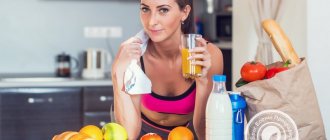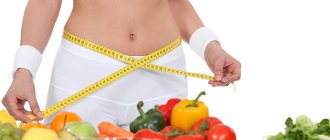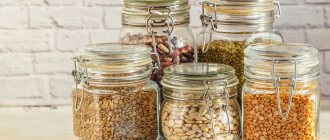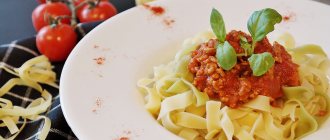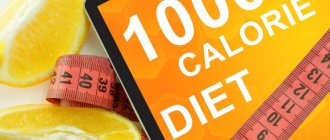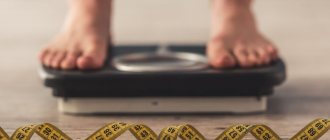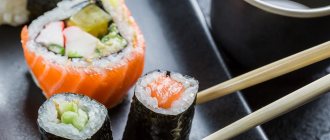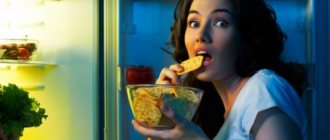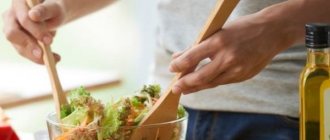April 25, 2011
Intestinal diseases interfere with the absorption of nutrients. How to organize meals to get everything you need from food?
Intestinal diseases most often lead to malabsorption of nutrients. The body experiences not only a deficiency of proteins or fats, but also other substances important for normal functioning - vitamins, calcium, potassium, iron. How should you organize your diet so that your body gets everything it needs from food?
A nutritious diet is possible
The basic principle of a diet for intestinal diseases is the most complete diet with sufficient calorie content. Impaired digestion of food leads to a person sharply losing weight not only due to fat reserves, but also due to muscle mass. Therefore, the amount of complete protein in the menu should be increased to 130-140 g
and higher. It is also necessary to make meals in fractions: five to six meals a day can reduce the load on the digestive tract and improve the absorption of nutrients.
Principles of proper nutrition after a diet - menu
The basics of the diet exit menu are quite simple; by listening to these tips, you can not only maintain weight, but also continue to lose it gradually.
- Since the portions during the diets were very small, the previously stretched stomach began to shrink. This is very good because it prevents overeating. But we must not reverse the process. To do this, you need to continue to eat food in small quantities at a time.
- There is a rule according to which the number of kilograms lost must be multiplied by 2. The result obtained will be equal to the number of weeks during which you must also maintain proper nutrition. But you need to add fiber-rich fruits and vegetables to your diet. Sweets are allowed in minimal quantities.
- We must learn to notice when the moment of saturation has arrived. To do this, you should not only care about what to eat, but also at what speed. Slow absorption of food makes it possible to stop in time when the body signals that there is enough food in the stomach. This usually happens 20 minutes after the start of the meal.
- To start a normal metabolism, we must not forget about the daily consumption of large amounts of pure water (at least 1.5 liters).
- In order to have enough strength to do everything, you need to exercise and take vitamins for the first time after the diet, since you still get very little of them with food.
Minerals from dairy products
Dairy products will help replenish mineral deficiencies. The protein and fat in them are absorbed with minimal stress on the digestive organs, and there is enough phosphorus and calcium to maintain the balance of these substances in the body at a normal level. Fresh milk and fermented milk products are sometimes very poorly tolerated for intestinal diseases, but unleavened cottage cheese
and low-fat and unsalted cheese are digested normally.
Therefore, in case of intestinal diseases, nutritionists recommend giving up even the most “healthy and natural” kefir or yogurt and choosing freshly prepared and well-squeezed cottage cheese and mild varieties of cheese
.
Let's take into account the features of the disease
Select other products depending on the characteristics of the disease. After all, for example, diarrhea and constipation require completely different diets. Products that stimulate bowel movements and have a strong laxative effect
: black bread, raw vegetables and fruits, dried fruits, legumes, oatmeal and buckwheat, stringy meat, fresh kefir, koumiss.
Foods rich in tannin (tea, blueberries), slimy soups and pureed porridges, warm and hot dishes weaken the functioning of the intestines
Diet No. 4
For the treatment of intestinal diseases, there is a special diet No. 4, which has four additional options, which are prescribed depending on the severity of the disease and the stage of its treatment. The strictest - in fact, No. 4
- is the most gentle for the entire digestive tract, with a reduced content of fats and carbohydrates.
All dishes for it must be steamed or boiled and be sure to puree to a soft puree. But diet No. 4c
is suitable for those who have suffered from intestinal diseases and want to gradually switch to a normal, nutritious diet. The calorie content of such a diet is up to 3000 kcal, which is good for those trying to gain back those lost due to illness. Meal intake is fractional.
Therapeutic nutrition for acute lung diseases
When acute lung disease occurs with severe damage to lung tissue accompanied by hypercatabolism, it is important to prevent protein breakdown to compensate for alveolar damage and respiratory distress.
It is worth noting that with most diseases of the respiratory system, there is a lack of appetite, malaise and fatigue. If there is a cough, shortness of breath, or difficulty breathing, then eating may be generally difficult, and then artificial parenteral or enteral nutrition is required.
Therapeutic nutrition for pneumonia should reduce the overall intoxication of the body due to the entry into the blood of a large number of toxins and damage to the lung tissue. As with any other severe inflammatory process, you should increase the calorie intake, make it plentiful, but in small portions with frequent meals.
The energy value of the diet increases mainly due to protein. In this case, fermented milk products that are rich in proteins and calcium will be useful. Fats in the diet are reduced, and preference is given to healthy fatty acids, in particular Omega-3.
The consumption of sugar and simple carbohydrates is also limited. This is due to the fact that when the level of glucose in the blood increases, the relief of the inflammatory process decreases and the production of bacteria increases, which can lead to complications of pneumonia.
Preference is given to liquid foods (broths, non-rich soups, purees, cereals), which are well processed thermally and mechanically to reduce the load on the gastrointestinal tract. You can eat even up to 7 times a day, the main thing is that the daily caloric intake is sufficient. Cold and very hot dishes are excluded; it is better to steam them.
Simultaneously with the increase in the amount of proteins, the proportion of carbohydrates decreases, which in high concentrations contribute to the development of the inflammatory process. As for liquids, you can drink fruit and vegetable juices, compotes, jelly, fruit drinks, tea and, of course, water (up to 2-2.5 liters in total per day).
For faster recovery of the lungs after pneumonia, it is necessary to additionally take vitamin and mineral complexes, in particular, vitamin C, vitamin D3, zinc. Salt is limited to 7-8 g per day. We can recommend therapeutic diet No. 13.
After the cessation of the inflammatory process, it is necessary to place emphasis in therapeutic nutrition on the rapid restoration of lung tissue. The calorie content of the diet can be further increased, bringing it up to 3200 kcal per day. The proportion of proteins remains high, the amount of fats and carbohydrates also increases relative to the norm, but proteins should still predominate. You can switch to diet No. 11.
Please note that with an increased risk of developing respiratory failure (decreased oxygen saturation levels in the blood) in severe pneumonia, especially in people with limited respiratory reserve, a therapeutic diet with a higher quota of fats than carbohydrates should be prescribed. In this case, lipids should make up more than 50% of non-protein calories.
It is impossible to overfeed such people, so as not to provoke pressure from a full stomach on the diaphragm. It is recommended to increase the number of meals while simultaneously reducing portions, but maintaining the recommended increased calorie intake. It is especially important to adhere to this rule after stopping artificial ventilation and switching to independent breathing.
Diet No. 4c
| Products | It is forbidden | Can |
| Bread | Baked goods, filled pies, sweet pastries | Dry biscuits, low-fat cookies, day-old bread |
| Soups | Fatty rich broths, soups with meat | In a weak low-fat broth with cereals, noodles and well-cooked vegetables |
| Meat and fish | All sausages, frankfurters, meat from old animals, all fried foods | Lean meat without tendons, in the form of cutlets or meatballs, poultry without skin, lean fish. Everything is steamed, boiled or baked without fat. |
| Cereal dishes, side dishes | Millet and pearl barley porridge, sweet milk porridge, large pasta, mushrooms, garlic, radish, sorrel, raw green vegetables | Loose porridges from tender cereals in water, puddings, small pasta with a little oil, boiled vegetables with a delicate texture |
| Eggs | Raw and hard-boiled, fried eggs | Steam omelettes, protein dishes |
| Sweet dishes | Pastries, cakes, sour fruits and berries | Baked apples, sweet berries and fruits with a delicate texture, natural sweet juices |
| Dairy | Whole milk, sour dairy products | Milk as an additive to low-fat and mild cheeses, non-acidic fresh cottage cheese, curd spreads and casseroles |
| Beverages | Sweet soda, strong tea and coffee, alcohol | Rose hip decoction, weak tea |
| Fats | Vegetables, lard, margarines and spreads | 10-15 g butter in dishes |
The most important
In case of serious intestinal diseases, the absorption of nutrients is very difficult, so the diet should be as balanced as possible and sufficiently high in calories.
But at the same time, you will have to exclude foods that can increase the load on the digestive organs and provoke an increase in the disease. Diet No. 4 is also a good way to regain the weight lost during illness. Tags:
- Diets
- Diet
- Intestines
- Therapeutic diets
1 comment • To leave a comment you must be an authorized user
- sasha_alexandra I used to suffer from intestinal problems, it all started after taking antibiotics for a long time. The microflora suffered, but I only found out that this was not the case right away. I also tried to eat healthy, mainly the above-mentioned foods. But only after a course of Evalar’s multiflora completely resolved the issue with the intestines. In short, it couldn’t have happened without support from the pharmacy.
Nutrition during and after coronavirus
Coronavirus infection is often accompanied by loss of smell, taste, and appetite. The infection itself and aggressive treatment methods in the acute period of the disease, including antibiotic therapy, lead to digestive disorders. Weakness, loss of strength, and increased fatigue are not only a symptom of the disease, but also a common cause of illness during the recovery period. Experts consider nutrition as an important factor in maintaining strength and energy, increasing the effectiveness of treatment. A balanced approach - a sufficient amount of easily digestible nutrients, vitamins and microelements - helps restore strength, support immunity and overall well-being.
The new coronavirus infection, which caused the pandemic, remains the focus of attention of the international scientific and medical community. To properly fight a disease, you need to know how it develops in the body and what effect it has on it.
The COVID-19 virus can affect all organs and systems of the body. The main symptoms of this infection are known to everyone: fever, cough and shortness of breath, more rare - diarrhea, nausea and vomiting. Most patients report muscle pain, decreased muscle mass, malnutrition, severe weakness, fatigue, and asthenia.
The impact also extends to the digestive organs, which can lead to disorders of the stomach, intestines, pancreas and liver, and poor absorption of nutrients and microelements.
That is why during treatment and recovery it is necessary to pay special attention to the correct diet, and in cases of severe weakness or serious loss of body weight, supplement regular food with specialized dietary therapeutic nutrition products.
Impact of COVID-19 on the digestive system
Typical symptoms of COVID 19 infection: loss of smell, taste, intoxication - suppress appetite.
Frequent dysfunction of the gastrointestinal tract aggravates the general condition and contributes to the progression of other symptoms of infection.
At the same time, to fight infection, the body needs increased amounts of protein, energy, vitamins and minerals. More energy and nutrition is required than usual. At the same time, due to illness, the patient cannot eat even the amount of food that he ate before the illness.
In addition, regular food often does not compensate for the increased nutritional and energy needs of a sick and recovering person. Severe weakness, loss of strength, fatigue, lack of appetite often remain for several weeks and even months after the main symptoms of the disease disappear, slowing down the restoration of normal well-being.
The use of therapeutic and preventive nutrition in such cases is a convenient solution to the problem.
How to eat healthy during COVID-19
The importance of nutrition as a therapeutic factor is noted in the recommendations of the Ministry of Health for the treatment of COVID infection (link). Nutrition should be easily digestible, have a balanced composition and all the necessary nutrients and micronutrients.
During illness, the need for protein and energy increases to 30% (10-13% for each increase in body temperature), and the amount of food consumed is significantly reduced, which in turn reduces immunity and complicates recovery.
To restore the strength and energy of sick and recovering people, there is easily digestible concentrated nutrition in the form of protein-energy drinks - specialized therapeutic and dietary preventive nutrition. This diet contains a complete vitamin and mineral complex, including zinc, selenium, antioxidant vitamins C and E, vitamins B2, B6, B12 for rapid recovery and maintenance of strength and immunity.
special attention to the amount of protein consumed and often recommend specialized nutrition for weakened patients.
An example of such nutrition would be Nestle's Resource product line.
Resource products are complete nutrition with a balanced complex of nutrients (proteins, fats, carbohydrates) and a complete vitamin and mineral complex, including zinc, selenium, antioxidant vitamins C and E, vitamins B2, B6, B12 to maintain strength and immunity. The resource is produced in the form of ready-made cocktails or a dry mixture for preparing a drink, and each serving replaces one meal of regular food in nutritional value.
It’s easy to find the right and most suitable product in the Resource line:
- Resource Protein - a high-protein product with a low amount of calories, suitable for people who need to restore strength, but do not want to gain excess weight
- Resource 2.0 (Resource 2.0;) is a high-energy product that can be used for severe weakness and weight loss. good for older patients
- Resource 2.0 + Fiber is enriched with dietary fiber necessary for digestion and is used for long-term use of specialized nutrition.
- Resource Diabetes + is a high-protein product created specifically for patients with diabetes
- Resource Optimum is a product in the form of a dry mixture for preparing a drink with the taste of a vanilla milkshake. In addition to all the necessary nutrients, it is enriched with prebiotics and dietary fiber, which contribute to normal intestinal function and strengthening the immune system. This is an economical format for specialized nutrition: one can of the mixture is designed to prepare 8 servings. Moreover, each serving can replace one meal.
In case of dysfunction of the gastrointestinal tract, a therapeutic diet based on hydrolyzed (split) protein - Peptamen - is suitable. Digested protein is more easily absorbed by the body without the participation of enzymatic systems, which improves absorption and eliminates diarrhea.
Additional therapeutic nutritional mixtures can serve as additional support for home rehabilitation after an infection of patients, especially for elderly and senile people who have a harder time and take longer to restore strength and well-being.
Finally
Problems with nutrition and digestion against the background of severe asthenia (weakness and loss of strength) are one of the most common problems of coronavirus, along with respiratory manifestations. It is a complete diet, containing all the vital elements, that is a complete source of energy for recovery. Adding specialized mixtures to the diet is a help for those suffering from diseases of the digestive system.
Nestlé therapeutic food products are designed to solve nutritional problems in various diseases, and can also be used in people with coronavirus infection.
Resource specialized nutrition in the form of ready-made cocktails in bottles or a dry mixture for quick preparation of a drink has a balanced composition of proteins, fats, carbohydrates, vitamins and minerals. In the Resource product line, it is easy to choose nutrition depending on the characteristics and taste preferences of each person.
